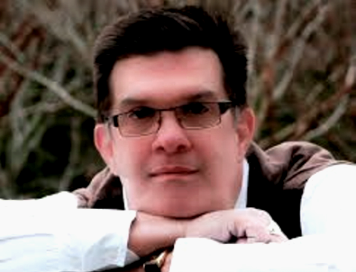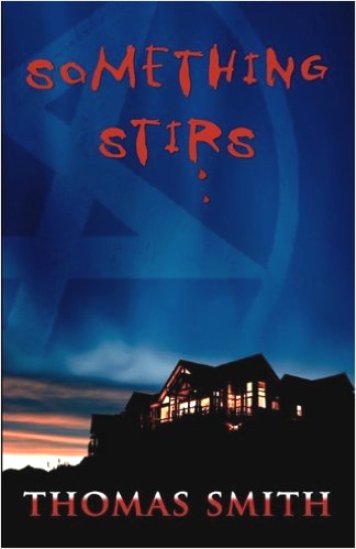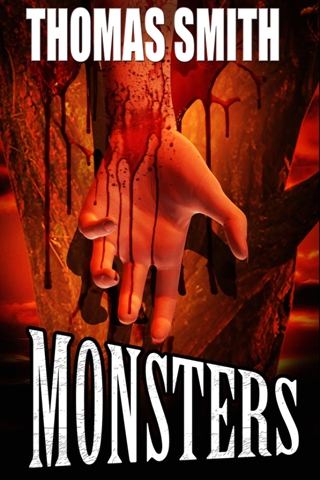

Christian Horror -- Is there such a thing?
Thomas Smith tells us "Yes indeed!"
IN THE "SPECIAL PAGE" ARCHIVES:
Bentley Little
Joe R. Lansdale
W.D. Gagliani
Tim Waggoner
Jay Wilburn
Simon Clark
Ellen Datlow
Joe McKinney
Christian Horror: It’s not as Strange as it Sounds
By Thomas Smith
"The role of the artist is to not look away." --- Akira Kurosawa
Christian horror.
At first glance the words seem to go together like jumbo shrimp or controlled chaos; the concept seems to be something of an oxymoron. But on closer examination, the two are more closely entwined than you might think. For example, as observed on the besthorrornovels.com Christian Horror page: “Christian beliefs are rife with the supernatural, from angels and demons to the devil himself. The book of Revelation, for example, reads almost like a Clive Barker novel. So, it's easy to see how the two could, in fact, work together.”
And while the concept works on one level, the term is also limiting. It is a double-edged sword. On the one hand, it does provide a foot in the door that allows publishers to bring horror stories to a Christian audience. But the same label that opens one door a crack can slam another one tight.
In Christian horror the story is always populated by “the God Who is There.” Mike Duran, pastor and author, makes this distinction in his post “On ‘Christian Horror’ and Atheist Dread” and such stories are the opposite of what can be called atheist horror, which is based on “The God who Isn’t.”
In Christian horror there is always the promise of a God who, even if he does not directly intervene in the horrific situation, stands ready to strengthen the characters and give them the internal fortitude and spiritual stamina they will need to prevail. Or at least to survive. In the process characters often have the opportunity to shed at least some of the physical and/or emotional baggage that has held them back and draw on their fledgling reserves to face the evil in a way they never would have been able to in the past.
And in Christian horror there is always the promise of “the God Who is There.” In the case of the atheist horror once the battle is over and the evil is vanquished, there only what Duran calls “the Great Void.”
It is important to note here, none of this is intended as a value judgment and is in no way an attempt to denigrate any horror that can’t be categorized as strictly Christian/Religious. I cut my eyeteeth reading everything from Stephen King and Richard Matheson to Bentley Little and Richard Laymon. I still do. And I began my career writing horror fiction. I still do that too (my story, The Heart is a Determined Hunter, appeared in The Horror Zine about a year ago, and I have a new horror novella coming out from another publisher in a few months). The distinction is, instead, a look at the genre, and the publishing industry, particularly the CBA (Christian Booksellers Association) and the ABA (American Booksellers Association) and how the CBA in articular approaches the “Christian horror” genre.
Before we move on, let’s pause a moment and ruffle a few feathers. I will use the term Christian horror, but I don’t like it. Then again, I don’t particularly like calling horror a genre. Horror is an emotion. Like wonder, amazement, love, terror, gratitude, thankfulness, rage, sorrow, and elation. And prior to the advent of Stephen King, tales of terror, horror, etc., were simply fiction. It was only when King and a few others began to run up massive numbers did advertising types realize they could corral similar tales and give them their own “genre” and a new marketing tool was born.
The problem is, in the case of Christian horror, it has backfired. As Mike Duran has observed, “I don’t like the term “Christian Horror.” Yes, I use that term. But it’s only as a common descriptor of a genre label that religious writers would understand. The truth is, marketing anything as “Christian” will immediately turn off most non-Christian audiences. Sure, it may attract religious readers. But the general reading or movie-going public is not beholden to such labels. For example, The Conjuring was directed by two avowed Christians. Nevertheless, the film is rightly marketed as horror. There is a tremendous amount of religious iconography and jargon in the movie. However, the moment you label the film “Christian,” you heighten the narrow expectations of a certain demographic while chasing others away. Which is why I go easy on the “Christian Horror” label.”
In the CBA the idea of Christian horror as an actual genre is relatively new although there have been many books over the past two-hundred plus years that could fall under that heading, including: The Screwtape Letters, by C. S. Lewis (1942); Seeker to the Dead, by A. M. Burrage (1942); The Room in the Tower and Other Stories, by E. F. Benson (1912); The Monk, by Matthew Gregory Lewis (1796). All of the books sold well to Christian and non-Christian readers alike. It is only recently that the publishing industry has narrowed their collective foci and kept the horror story on the fringe. And in the ABA world works like The Stand (Stephen King) and The Darkest Evening of the Year (Dean Koontz), while not strictly Christian fiction, deal with intense theological questions of good, evil, and divine influence.
“Christian publishing houses largely miss ANY opportunity to exploit the power of the horror genre,” Duran says. “Whereas Christian artists have historically employed horrific imagery in their art to shock and stir the imagination (like Dante, Bosch, Machen, and Charles Williams), contemporary Christian publishing is in a death grip to more conservative evangelical audiences. This is why the typical fare of mainstream Christian publishers is Amish fiction and romantic suspense.”
If we look at horror for the Christian market in its simplest form, it is a vehicle for conveying ideas. It is the canvas on which the story is told. Nothing more, nothing less. Just as writers use science fiction, romance, adventure history, and humor to tell their stories, the horror writer does the same thing.
For example, when my novel Something Stirs (one of the first haunted house stories for the Christian market) came out, the publisher made every effort to have me added to a caravan of Christian authors traveling around the country doing readings and book signings. The publisher was told by the organizer that I wouldn’t be included because, “…I don’t want that kind of thing sticking in my head.” I later said in an interview (knowing the organizer would see it), “If they didn’t want a story that emphasizes the power of Christ, the nobility of sacrifice, and the fact that no one is so broken that they are beyond redemption, then it’s a good thing I wasn’t included.”
It’s just a canvas (albeit a scary one).
“When Christian publishers do manage to print something horror-related,” Duran says, “they cannot even label it as such. Which is why Thriller and Supernatural Suspense are the go-to labels for “Christian Horror.” The very word “horror” evokes an allergic reaction from the typical hyper-conservative Christian reader.”
It’s a case of missing the forest because of the trees.
In his essay for decentfilms.com, The Cross and the Vampire: Religious Themes in Terrence Fisher’s Hammer Horrors, Steven D. Greydanus shows the direct influence director Terrence Fisher’s faith had on the Hammer horror films he directed. “Fisher has called his films ‘basically morality plays’ that reflect his personal belief in ‘the ultimate victory of good over evil,’ and the star of Fisher’s Dracula films, Christopher Lee, has cited the ultimate destruction of evil in Fisher’s films as the reason ‘the Church doesn’t object to these films, and why they are so popular in Ireland, Spain and Italy.’”
Scott Derrickson, director of Sinister, Hellraiser, The Exorcism of Emily Rose, and the upcoming Doctor Strange, has commented often on the relationship between horror and religion. In the November 13, 2015 edition of Relevant Magazine he said, “I think it is the genre that is most friendly to the subject matter of faith and belief in religion. The more frightening and sort of dark and oppressive a movie is, the more free you are to explore the supernatural and explore faith.”
Even a decade earlier he told Peter Chattaway in a Christianity Today article (August 30, 2005), “It's about admitting that there is evil in the world, and recognizing that there is evil within us, and that we're not in control, and that the things that we are afraid of must be confronted in order for us to relinquish that fear.”
The horror tale is a perfect vehicle for that message. And the writers and handful of publishers who are struggling to capture the power of the horror story for a new readership want to make that happen. But they are in for an uphill trip.
If you’d like to sample some of the offerings in this genre, try these:
The Resurrection, The Telling, The Ghost Box, or Christian Horror by Mike Duran
Thr3e by Ted Dekker
The Dead Whisper On by T. L. Hines
Demon: A Memoir by Tosca Lee
When the Day of Evil Comes by Melanie Wells
Field of Blood by Eric Wilson
The Visitation by Frank Peretti
Reckoning, or Nightbringer by James Byron Huggins
Scream by Mike Dellosso
Something Stirs by Thomas Smith
Thomas Smith’s work has appeared in many publications, including Cemetery Dance, Horror 101: The Way Forward, Quietly Now: An Anthology in Tribute to Charles L. Grant, and Tales to Terrify. His novel, Something Stirs, was the first haunted house novel for the Christian market. His greatest achievement was the day Charles L. Grant read this story and said, “Damn, I wish I’d written that.”
He was selected as part of the writing team (including Rick Warren, Chuck Colson, Lee Strobel and Ravi Zacharias) to Create Zondervan’s New Men’s Devotional Bible.
Thomas has been a joke writer for Joan Rivers and a comedy writer for The Steve & Kathy Show (Emmy winning Christian TV variety show).
Interesting Fact: Thomas may be the only writer to ever work on projects with Stephen King and the Rev. Rick Warren at the same time.
See more about Thomas HERE


